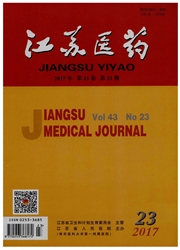

 中文摘要:
中文摘要:
目的 探讨耐药相关基因基因在复发难治性非霍奇金淋巴瘤(NHL)中的表达及其临床意义。方法 用免疫组织化学SP法检测60例复发难治性NHL患者P-糖蛋白(P-gp)、谷胱甘肽转移酶-π(GST-π)、Bcl-2和DNA拓扑异构酶Ⅱ(TopoⅡ)蛋白表达,分析其与NHL化疗疗效及预后的关系。结果 复发难治性NHL患者的P-gp、GST-π、Bcl-2和TopoⅡ蛋白表达分别为68.3%、61.7%、45.0%和48.3%。P-gp、GST-π和Bcl-2的表达与临床分期相关(P〈0.05);TopoⅡ的表达与观测临床参数无相关性(P〉0.05)。与寡耐药基因表达组(1种或无耐药基因表达,17例)NHL比较,多耐药基因表达组(≥2种耐药基因表达,43例)化疗有效率(37.2%vs.70.6%)和生存率较低(P〈0.05和P〈0.01)。结论 检测P-gp、GST-π、Bcl-2和TopoⅡ蛋白表达可作为NHL患者化疗疗效的预测指标,有助于选择相应的化疗药物,实施个体化治疗。
 英文摘要:
英文摘要:
Objective To investigate the expressions and clinical significance of drug resistance- related genes in relapsed and refractory non-Hodgkin's lymphoma (NHL). Methods The drug resistance-related genes of P-glycoprotein ( P-gp ), glutathione-S-transferase-π ( GST-π ), B-cell lymphoma gene 2 (Bcl-2) and topoisomerase(Topo Ⅱ ) in NHL were detected by immunohistochemically SP staining in 60 patients with relapsed and refractory NHL. The relationship between the expressions of the genes and chemotherapy efficacy and the prognosis was analyzed. Results The expressions of P-gp,GST-π,Bcl-2 and Topo Ⅱ were 68. 3%,61.7%,45.0% and 48. 3% in 60 NHL samples. The expressions of P-gp, GST-π and Bcl-2 were related to clinical stages(P〈0. 05). There were no relationship between the expression of Topo Ⅱ and clinical feactures (P〉0. 05 ). The effectiveness rate and survival rate were lower in the cases with two or more drug resistance-related genes than in those with one or none drug resistance-related gene(P〈0. 05 and P〈0. 01). Conclusion The expressions of P-gp, GST-n, Bcl-2 and TopoⅡ in NHL can be used as the predictors of chemotherapy efficacy in the patients with relapsed and refractory NHL. Combined detection of them is helpful in the selection of suitable drugs for individualized chemotherapy in relapsed and refractory NHL patients.
 同期刊论文项目
同期刊论文项目
 同项目期刊论文
同项目期刊论文
 期刊信息
期刊信息
